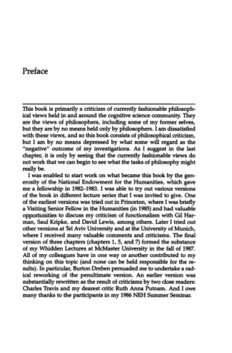
Representation and Reality PDF
137 Pages·1988·21.771 MB·English
Most books are stored in the elastic cloud where traffic is expensive. For this reason, we have a limit on daily download.
Preview Representation and Reality
Description:
Hilary Putnam, who may have been the first philosopher to advance the notion that the computer is an apt model for the mind, takes a radically new view of his own theory of functionalism in this book. Putnam argues that in fact the computational or functionalist analogy cannot answer the important questions about the nature of such mental states as belief, reasoning, rationality, and knowledge that lie at the heart of the philosophy of mind.Putnam asserts that the "old" computational view that "our function is more important than our matter" needs new interpretation: mental states cannot be identified with physical-chemical states, or with functional states. He tackles the difficult question of whether there is a physical/computational "equivalence" between the structures of all possible systems containing a physically possible organism which holds a particular belief. If such an equivalence relation existed, Putnam notes, it would be undiscoverable. Not just undiscoverable by human beings, but undiscoverable by any possible physically intelligent beings.A Bradford Book.
See more
The list of books you might like
Most books are stored in the elastic cloud where traffic is expensive. For this reason, we have a limit on daily download.
